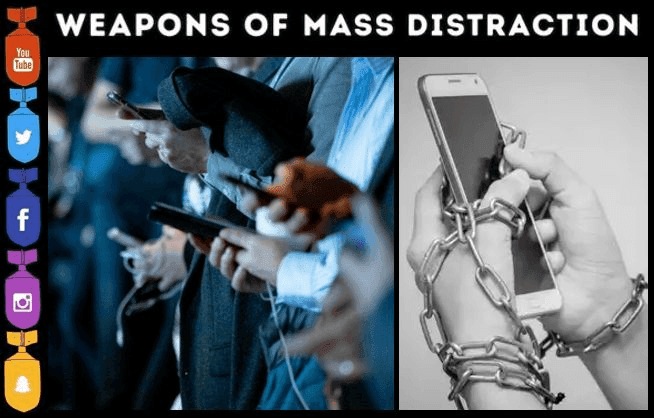 Like many people, in the morning I catch up on the news. I subscribe to several mainstream news outlets, and there was a fascinating article in the Telegraph recently titled ‘weapons of mass distraction.’ The article discussed the psychological aspects/issues of social media (SM) apps and how they are designed to keep users on them for as long as possible. Technology companies produce algorithms to ensure that users are being ‘programmed’ to regularly check updates, posts and messages.
Like many people, in the morning I catch up on the news. I subscribe to several mainstream news outlets, and there was a fascinating article in the Telegraph recently titled ‘weapons of mass distraction.’ The article discussed the psychological aspects/issues of social media (SM) apps and how they are designed to keep users on them for as long as possible. Technology companies produce algorithms to ensure that users are being ‘programmed’ to regularly check updates, posts and messages.
Research indicates that on average a user spent 2.5 hrs a day on SM in 2022. Half of our time on our phones in 2022 was reserved for SM. Facebook is the most popular, costing people an average of 58 mins each day. According to Dr. Mark Griffiths, UK’s leading addiction expert, SM firms such as Facebook have developed an arsenal of techniques to keep us glued to their products. He has identified 7 “hooks”, drawn from 31yrs studying the gambling industry, which drive “habitual use,” not addiction in the clinical sense, but frequent enough that other parts of your life may suffer. “I don’t think Facebook or Instagram are deliberately trying to addict people,” says Griffiths, “but what they are trying to do is maximise the time people are on their sites.” No wonder on average a person now touches, taps, or swipes their phone screen over 2,600 times a day, quite a sobering statistic.
There are clearly ways to reduce and control time spent on SM apps such as; closely tracking and limiting daily use (there’s an app this too!), set aside daily periods of non-screen time, have rules in place e.g. no phones while eating or during personal/work meetings, use a wristwatch – one of the most common reasons for looking at a smartphone is to check the time and if you have children avoid allowing phones and devices in bedrooms after lights out.
Despite the known concerns in regard to habitual SM use there appears to be little appetite to talk seriously and educate people about the problems associated with its use.
What is your view on the topic:
1. Nothing to worry about or should we be concerned and if so what should be done about it?
2. How long is too long on SM?
3. Do control measures really work?
4. Is educating users about the pros/cons of using SM the answer?
5. Should the owners of the platforms do more?
6. Should SM awareness be taught in schools?
7. Considerable time on SM sites equates to users more likely reading fake news or misinformation, which is another debate but linked to the wider use of SM













